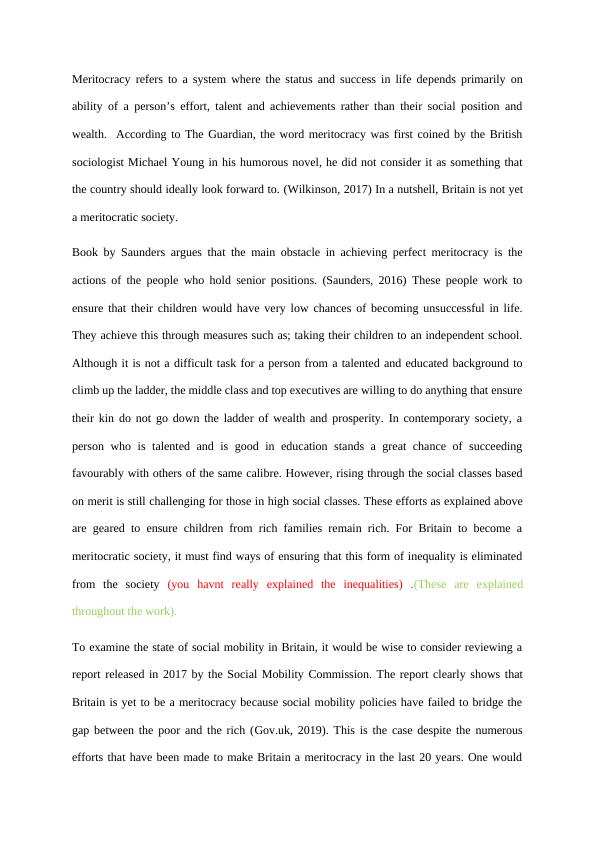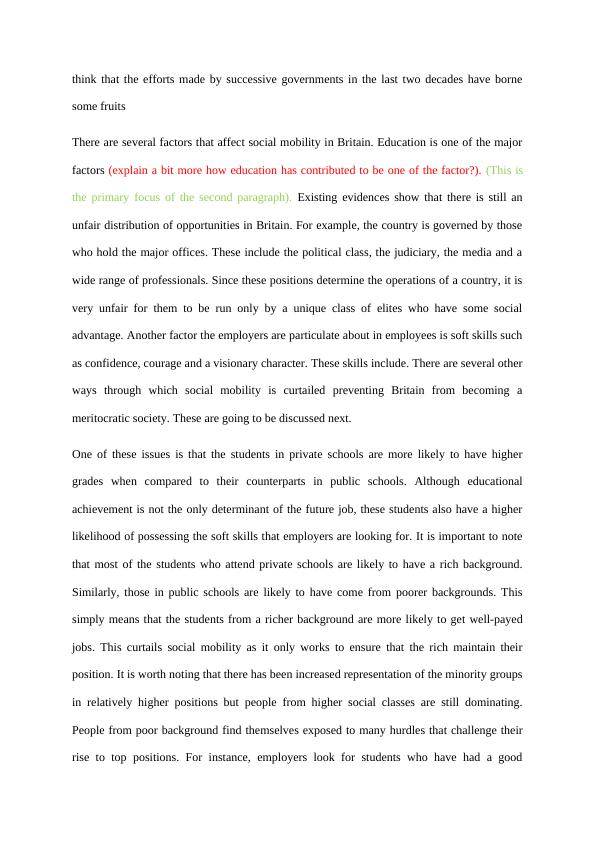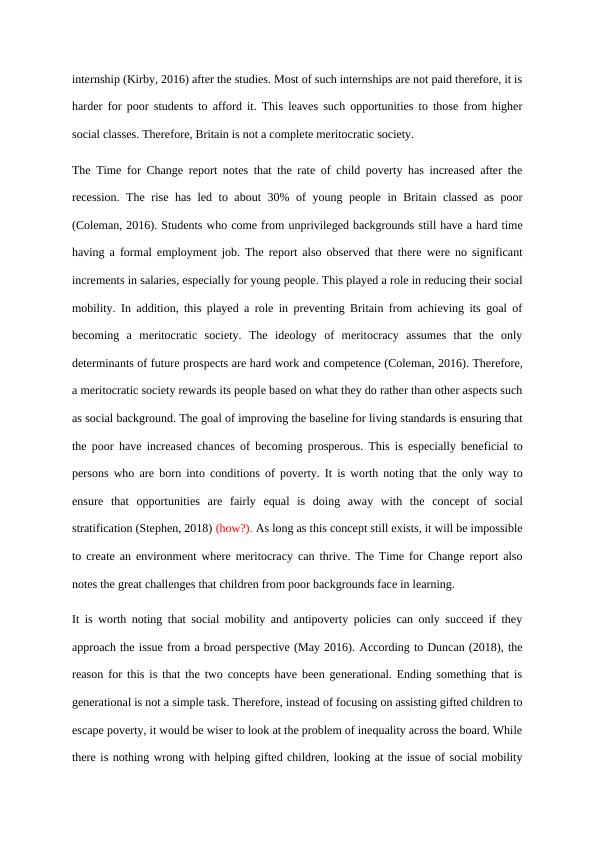Is Britain a meritocratic society? Discuss the problems associated with such a conception of society?
Added on 2023-05-27
11 Pages3019 Words218 Views
Is Britain a meritocratic society? Discuss the problems
associated with such a conception of society?
associated with such a conception of society?

Meritocracy refers to a system where the status and success in life depends primarily on
ability of a person’s effort, talent and achievements rather than their social position and
wealth. According to The Guardian, the word meritocracy was first coined by the British
sociologist Michael Young in his humorous novel, he did not consider it as something that
the country should ideally look forward to. (Wilkinson, 2017) In a nutshell, Britain is not yet
a meritocratic society.
Book by Saunders argues that the main obstacle in achieving perfect meritocracy is the
actions of the people who hold senior positions. (Saunders, 2016) These people work to
ensure that their children would have very low chances of becoming unsuccessful in life.
They achieve this through measures such as; taking their children to an independent school.
Although it is not a difficult task for a person from a talented and educated background to
climb up the ladder, the middle class and top executives are willing to do anything that ensure
their kin do not go down the ladder of wealth and prosperity. In contemporary society, a
person who is talented and is good in education stands a great chance of succeeding
favourably with others of the same calibre. However, rising through the social classes based
on merit is still challenging for those in high social classes. These efforts as explained above
are geared to ensure children from rich families remain rich. For Britain to become a
meritocratic society, it must find ways of ensuring that this form of inequality is eliminated
from the society (you havnt really explained the inequalities) .(These are explained
throughout the work).
To examine the state of social mobility in Britain, it would be wise to consider reviewing a
report released in 2017 by the Social Mobility Commission. The report clearly shows that
Britain is yet to be a meritocracy because social mobility policies have failed to bridge the
gap between the poor and the rich (Gov.uk, 2019). This is the case despite the numerous
efforts that have been made to make Britain a meritocracy in the last 20 years. One would
ability of a person’s effort, talent and achievements rather than their social position and
wealth. According to The Guardian, the word meritocracy was first coined by the British
sociologist Michael Young in his humorous novel, he did not consider it as something that
the country should ideally look forward to. (Wilkinson, 2017) In a nutshell, Britain is not yet
a meritocratic society.
Book by Saunders argues that the main obstacle in achieving perfect meritocracy is the
actions of the people who hold senior positions. (Saunders, 2016) These people work to
ensure that their children would have very low chances of becoming unsuccessful in life.
They achieve this through measures such as; taking their children to an independent school.
Although it is not a difficult task for a person from a talented and educated background to
climb up the ladder, the middle class and top executives are willing to do anything that ensure
their kin do not go down the ladder of wealth and prosperity. In contemporary society, a
person who is talented and is good in education stands a great chance of succeeding
favourably with others of the same calibre. However, rising through the social classes based
on merit is still challenging for those in high social classes. These efforts as explained above
are geared to ensure children from rich families remain rich. For Britain to become a
meritocratic society, it must find ways of ensuring that this form of inequality is eliminated
from the society (you havnt really explained the inequalities) .(These are explained
throughout the work).
To examine the state of social mobility in Britain, it would be wise to consider reviewing a
report released in 2017 by the Social Mobility Commission. The report clearly shows that
Britain is yet to be a meritocracy because social mobility policies have failed to bridge the
gap between the poor and the rich (Gov.uk, 2019). This is the case despite the numerous
efforts that have been made to make Britain a meritocracy in the last 20 years. One would

think that the efforts made by successive governments in the last two decades have borne
some fruits
There are several factors that affect social mobility in Britain. Education is one of the major
factors (explain a bit more how education has contributed to be one of the factor?). (This is
the primary focus of the second paragraph). Existing evidences show that there is still an
unfair distribution of opportunities in Britain. For example, the country is governed by those
who hold the major offices. These include the political class, the judiciary, the media and a
wide range of professionals. Since these positions determine the operations of a country, it is
very unfair for them to be run only by a unique class of elites who have some social
advantage. Another factor the employers are particulate about in employees is soft skills such
as confidence, courage and a visionary character. These skills include. There are several other
ways through which social mobility is curtailed preventing Britain from becoming a
meritocratic society. These are going to be discussed next.
One of these issues is that the students in private schools are more likely to have higher
grades when compared to their counterparts in public schools. Although educational
achievement is not the only determinant of the future job, these students also have a higher
likelihood of possessing the soft skills that employers are looking for. It is important to note
that most of the students who attend private schools are likely to have a rich background.
Similarly, those in public schools are likely to have come from poorer backgrounds. This
simply means that the students from a richer background are more likely to get well-payed
jobs. This curtails social mobility as it only works to ensure that the rich maintain their
position. It is worth noting that there has been increased representation of the minority groups
in relatively higher positions but people from higher social classes are still dominating.
People from poor background find themselves exposed to many hurdles that challenge their
rise to top positions. For instance, employers look for students who have had a good
some fruits
There are several factors that affect social mobility in Britain. Education is one of the major
factors (explain a bit more how education has contributed to be one of the factor?). (This is
the primary focus of the second paragraph). Existing evidences show that there is still an
unfair distribution of opportunities in Britain. For example, the country is governed by those
who hold the major offices. These include the political class, the judiciary, the media and a
wide range of professionals. Since these positions determine the operations of a country, it is
very unfair for them to be run only by a unique class of elites who have some social
advantage. Another factor the employers are particulate about in employees is soft skills such
as confidence, courage and a visionary character. These skills include. There are several other
ways through which social mobility is curtailed preventing Britain from becoming a
meritocratic society. These are going to be discussed next.
One of these issues is that the students in private schools are more likely to have higher
grades when compared to their counterparts in public schools. Although educational
achievement is not the only determinant of the future job, these students also have a higher
likelihood of possessing the soft skills that employers are looking for. It is important to note
that most of the students who attend private schools are likely to have a rich background.
Similarly, those in public schools are likely to have come from poorer backgrounds. This
simply means that the students from a richer background are more likely to get well-payed
jobs. This curtails social mobility as it only works to ensure that the rich maintain their
position. It is worth noting that there has been increased representation of the minority groups
in relatively higher positions but people from higher social classes are still dominating.
People from poor background find themselves exposed to many hurdles that challenge their
rise to top positions. For instance, employers look for students who have had a good

internship (Kirby, 2016) after the studies. Most of such internships are not paid therefore, it is
harder for poor students to afford it. This leaves such opportunities to those from higher
social classes. Therefore, Britain is not a complete meritocratic society.
The Time for Change report notes that the rate of child poverty has increased after the
recession. The rise has led to about 30% of young people in Britain classed as poor
(Coleman, 2016). Students who come from unprivileged backgrounds still have a hard time
having a formal employment job. The report also observed that there were no significant
increments in salaries, especially for young people. This played a role in reducing their social
mobility. In addition, this played a role in preventing Britain from achieving its goal of
becoming a meritocratic society. The ideology of meritocracy assumes that the only
determinants of future prospects are hard work and competence (Coleman, 2016). Therefore,
a meritocratic society rewards its people based on what they do rather than other aspects such
as social background. The goal of improving the baseline for living standards is ensuring that
the poor have increased chances of becoming prosperous. This is especially beneficial to
persons who are born into conditions of poverty. It is worth noting that the only way to
ensure that opportunities are fairly equal is doing away with the concept of social
stratification (Stephen, 2018) (how?). As long as this concept still exists, it will be impossible
to create an environment where meritocracy can thrive. The Time for Change report also
notes the great challenges that children from poor backgrounds face in learning.
It is worth noting that social mobility and antipoverty policies can only succeed if they
approach the issue from a broad perspective (May 2016). According to Duncan (2018), the
reason for this is that the two concepts have been generational. Ending something that is
generational is not a simple task. Therefore, instead of focusing on assisting gifted children to
escape poverty, it would be wiser to look at the problem of inequality across the board. While
there is nothing wrong with helping gifted children, looking at the issue of social mobility
harder for poor students to afford it. This leaves such opportunities to those from higher
social classes. Therefore, Britain is not a complete meritocratic society.
The Time for Change report notes that the rate of child poverty has increased after the
recession. The rise has led to about 30% of young people in Britain classed as poor
(Coleman, 2016). Students who come from unprivileged backgrounds still have a hard time
having a formal employment job. The report also observed that there were no significant
increments in salaries, especially for young people. This played a role in reducing their social
mobility. In addition, this played a role in preventing Britain from achieving its goal of
becoming a meritocratic society. The ideology of meritocracy assumes that the only
determinants of future prospects are hard work and competence (Coleman, 2016). Therefore,
a meritocratic society rewards its people based on what they do rather than other aspects such
as social background. The goal of improving the baseline for living standards is ensuring that
the poor have increased chances of becoming prosperous. This is especially beneficial to
persons who are born into conditions of poverty. It is worth noting that the only way to
ensure that opportunities are fairly equal is doing away with the concept of social
stratification (Stephen, 2018) (how?). As long as this concept still exists, it will be impossible
to create an environment where meritocracy can thrive. The Time for Change report also
notes the great challenges that children from poor backgrounds face in learning.
It is worth noting that social mobility and antipoverty policies can only succeed if they
approach the issue from a broad perspective (May 2016). According to Duncan (2018), the
reason for this is that the two concepts have been generational. Ending something that is
generational is not a simple task. Therefore, instead of focusing on assisting gifted children to
escape poverty, it would be wiser to look at the problem of inequality across the board. While
there is nothing wrong with helping gifted children, looking at the issue of social mobility

End of preview
Want to access all the pages? Upload your documents or become a member.
Related Documents
The Meritocracy Mythlg...
|8
|1979
|80
Understanding Societies: Meritocracy and Non-Merit Factors in the Australian Education Systemlg...
|8
|2151
|263
